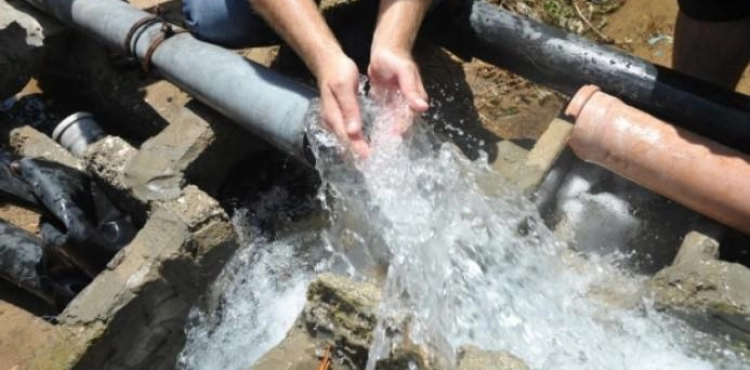The arduous task that Palestinian farmer Ghassan Al-Najjar is enduring to obtain sufficient irrigation water for his land in the village of Burin in Nablus in the northern West Bank.
Al-Najjar, who is in his thirties, complains about the multiplication of his ordeal with the onset of the summer season, due to the repercussions of the new Corona virus (Covid 19) and the Israeli measures that led to the scarcity of water resources for the Palestinians.
Al-Najjar says that he is forced to buy water at his expense 4 days a week to irrigate agricultural crops on his 10-donum area of ​​land, for fear of damaging it.
The main water line by the Nablus municipality provides the Najjar land with water only two days per week due to the recycling system that follows the fact that the village is far away.
Al-Najjar indicates that his agricultural crops need daily irrigation in order not to be damaged, which leads him to buy water from private companies for the price of $ 30 each day that they are cut off.
The purchase of water at its expense increases its economic burden, as is the case with farmers in the region, and the crisis of (Covid-19) increased the demand for water and caused more material losses for them.
Al-Najjar explains that the crisis caused him to cultivate half of his land, due to the lack of water and the difficulty of exporting products to other cities in the West Bank for the past two months due to government closures.
The Palestinian farmer also complains that the Israeli authorities prevent him from drilling a water well inside his land on the grounds that it is located in Area C, and is subject to Israeli security and administrative control according to the (Oslo) interim peace agreement signed between Israel and the Palestine Liberation Organization in 1993.
The forty-year water crisis is driving Shadi Ghassan from the center of Nablus to buy spare "tanks" to overcome the problem of water shortages that he has been suffering from for years in the summer and increased this year due to the crisis.
Ghassan, who supports a family of 6, says that the summer "represents a suffering for his family in obtaining water because of its shortage and frequent interruptions for most of the week."
He adds that "water consumption increased with the start of the current Corona crisis due to the large use of personal and household hygiene, which threatens a hot summer from its beginning."
A few days ago, the Palestinian Water Authority accused Israel of starting to reduce the quantities of water to several major cities in the West Bank, notably Ramallah, Nablus, Jenin, and Hebron, which led to a disruption in the regularity of water pressure on the transmission lines and networks.
The head of the Water Authority, Mazen Ghoneim, says that it is expected that the demand for water will increase in the summer by nearly 30 percent compared to the winter season, adding to the current crisis.
Ghoneim explains that the rate of increase varies among the governorates of the West Bank in terms of the most practiced activities in each governorate.
He adds that the increase may exceed the 50 per cent barrier in the northern West Bank governorates as a result of the abundance of agricultural lands and dependence on irrigated agriculture in the summer, while the average increase in the central and southern governorates is about 17 to 22 per cent.
He points out that the main reason for this is because Israel controls more than 85 percent of the water sources for the Palestinians.
Ghoneim explains that the quantities of water available from the main sources are limited and semi-fixed and do not meet the expected increase in demand during the summer months, especially in light of the spread of Coronavirus.
And the Palestinian Authority has previously called for international pressure on Israel to stop using water as a tool to restrict Palestinians and the need to adhere to international laws and treaties.
The water issue is one of the main issues of negotiations between the Palestinians and Israel in the peace talks stalled since the first half of 2014 without the prospect of resuming them soon to resolve the decades-old conflict.
Water expert Abdel-Rahman Al-Tamimi from Ramallah says that the water crisis hits a number of West Bank cities every summer, but this year will increase due to Corona´s disease due to the high consumption for the purpose of increased cleaning and personal care.
Al-Tamimi explains that the water crisis is caused by Israel drilling new wells in the West Bank that affect Palestinian wells, pointing out that the available quantity makes about 30 percent of the population not receiving enough water throughout the week.
He warns that the Palestinians get 150 million cubic meters annually through wells they run or buy from the Israeli company (Mekorot), even though their needs exceed 350 million.
Al-Tamimi believes that overcoming the crisis will be through finding a political solution in which the Palestinians will be free to extract and distribute water, to benefit as much as possible from rain water, by building dams devoted to agriculture, and taking advantage of the water of the valleys, especially the Jordan River.
The Palestinian expert warns that the coming years may be "bad if the situation continues as it is in light of the population and urban growth in Palestine and the risks of declining agricultural areas and a decrease in the quantities of water allocated for drinking."












